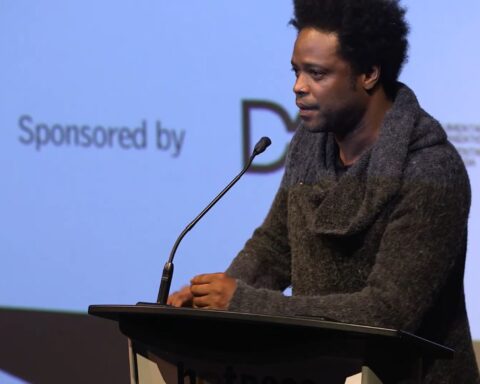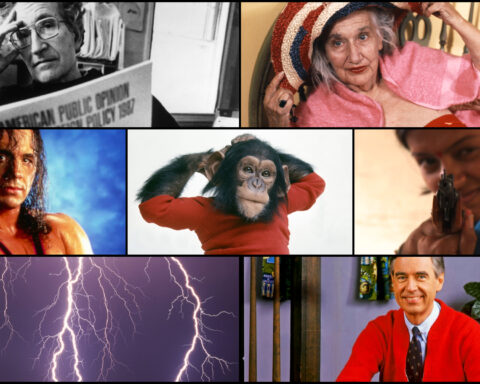“Whoever tries to imagine perfection simply reveals his own emptiness.” The words belong to George Orwell, whose 1943 essay “Why Socialists Don’t Believe in Fun” parses the Utopian fictions of H. G. Wells, Jonathan Swift, Aldous Huxley and others to point out the odd paradox at their core: that the citizens of these idealized societies don’t seem especially happy. Pointing out that the word ‘Utopia’ translates as a ‘non-existent place,’ Orwell sneers that those novels, which strive to depict a world where humankind’s least appealing impulses have been eliminated, serve primarily as allegories of their own limited literary and philosophical interest. “Take away the folly and scoundrelism,” he says, “and all you are left with, apparently, is a tepid sort of existence, hardly worth leading.” Or, it’s implied, reading.
Orwell would go on to savage Utopian idealism at length a few years later in Nineteen Eighty-Four, perhaps the most enduring vision of a scarily totalitarian society ever committed to paper. Received at the time of its publication as acautionary tale about the postwar world, the book has been subsequently analysed through a series of political filters; in the absence of any actual Thought Police, academics and amateurs alike are free to interpret Orwell’s tale of surveillance and mental manipulation as they please. For instance, in 1988’s Manufacturing Consent: The Political Economy of the Mass Media, Edward S. Herman and Noam Chomsky expound upon the real-world corollaries to Orwellian “doublespeak”—the language of ideological insinuation practised by world leaders and public relations reps alike.
It should be noted, though, that the 1992 feature film version of Manufacturing Consent was co-directed by two of those fun-loving socialists that Orwell claimed did not exist: Mark Achbar (later the co-director of The Corporation) and, of course, Peter Wintonick, the Governor General’s award–winning filmmaker—or, just as accurately, film maven—who recognized a kindred spirit in Chomsky’s text and set about trying to spread its message to as many viewers as possible. When Wintonick passed away in November of last year after a pitched battle with liver cancer, Manufacturing Consent was the movie most often cited by obituary writers, and for good reason. Even at 167 minutes, it stands as one of the great feats of intellectual and narrative compression in contemporary non-fiction cinema. But its prescience in describing the perils of globalization belies the fact that Wintonick never lost faith in the notion of Utopias: in almost every interview he gave in the years before his death, the director expressed a desire to make a movie on the subject of a perfect society.
There’s a tingling contradiction in the idea of a documentary about Utopias: how does one ethnographize a ‘non-existent place’? For some non-fiction filmmakers, it’s a realm invoked sardonically, as in John Pilger’s ITV production Utopia, which examines the exploitation of Australia’s Indigenous population by colonial interlopers. The fact that the continent’s Northern Territories are still called “Utopia” is presented as a cruel irony, albeit a layered one; it’s implied that the name is less ridiculous than simply out of date. In contrast to the bulk of science-fiction films that imagine Utopia as a technocratic inevitability — from Logan’s Run to Aeon Flux — Pilger’s film takes up the argument that it’s already been irretrievably lost, an image glimpsed in our collective rearview mirror.
There’s a more progressive slant to Sam Green and David Cerf’s Utopia In Four Movements, an innovative “live documentary” that debuted to great acclaim at the 2010 Sundance Film Festival. Praised by no less a master of the screwed-and-chopped montage form than Adam Curtis—whose collage films like The Power of Nightmares work to locate dystopia rather than utopia in our contemporary lives—the film was presented on the festival circuit as a kind of interactive experience. Green, who was nominated for an Oscar for his previous documentary The Weather Underground, narrated the film in person, cueing a series of images via laptop, while Cerf did the sound cues (additional music was provided by a Brooklyn band called The Quavers). In terms of its content, Utopia in Four Movements falls in line with what might be called “network narrative documentaries,” a structure that unravels seemingly disparate storylines before reconciling them within an underlying theme. (It’s a tactic beloved by Jennifer Baichwal in both Payback and Watermark.)
But the idea of a movie designed to challenge notions of complacency that is itself a bit of a shock to the system, exhibition-wise, is clever and conceptually sound. In an interview on the film’s website, Green explained that the “live” aspect of Utopia in Four Movements was in part “a response to the crisis facing cinema today… it seems as if filmmakers either have to embrace the notion of people watching their work furtively, in stolen moments, on laptops and iPods, or create something that cannot be reduced to a digital file.” Ironically, it’s precisely the most interestingly unconventional aspect of Utopia in Four Movements that’s prevented it from gaining much traction in the years after its release. Unless Green and Cerf are willing to go door to door with their interactive act, the film’s shelf life seems brief.
There is a number of other worthy contemporary non-fiction films that engage with the idea of idealized communities, even if they come at their Utopian themes from oblique angles. David York’s excellent Wiebo’s War finds the Toronto-based director hunkered down with the notorious environmental activist Wiebo Ludwig, whose self-styled Christian community in Alberta became a base of operations for a lopsided and violent battle against the province’s oil and gas companies. In York’s hands, what could have simply been an indictment of an eccentric recluse who was suspected of being indirectly involved in the shooting death of a local teenage girl becomes a sticky meditation on the possibility of detaching from society. Watching the film, it’s difficult to tell if Ludwig’s desire to keep his flock at arm’s length from their neighbours is purely reactionary or a byproduct of some sort of genuine optimism about the possibilities of a purer, more devout lifestyle.
There is of course no shortage of films, non-fiction or otherwise, about messianic cults. In the last few years alone, we’ve seen Sean Durkin’s superbly shot and edited thriller Martha Marcy May Marlene (with its star-making performance by Elisabeth Olsen) and Ti West’s disappointing but atmospheric TIFF 2013 entry, The Sacrament, a loosely fictionalized riff on Jonestown (complete with lethally spiked Kool-Aid) unconvincingly disguised as a Vice magazine video travelogue.
More interesting than either of these wholly scripted productions, however, is Jason Osder’s Let the Fire Burn. It is a mesmerizing found-footage assembly of the 1985 standoff between Philadelphia police and the members of MOVE, a radical black liberation movement. MOVE’s members were vegans and animal rights activists who advocated getting back to nature; however, where Wiebo Ludwig moved his brood as far away from the city as possible in order to practice what he preached, MOVE took over a row house in the middle of one of Philadelphia’s poorest neighbourhoods.
Osder’s skilfully edited combinations of vintage news broadcasts and closed-circuit municipal post-mortems reveal the tragedy of a clash between a group that declaimed the brutality and repressiveness of their democratically elected officials and the law enforcement officials who ultimately ended up vindicating certain of leader John Africa’s claims: incredibly, after hours of back and forth hostilities, a helicopter dropped a bomb on MOVE’s headquarters, killing eleven people (including five children).
It would be interesting to find out what Peter Wintonick made of Wiebo’s War and Let the Fire Burn; no doubt he had opinions on them. Although he died too young at age 60, Wintonick was far from a fuzzy-headed dreamer: his success and staying power within the Canadian film industry—a horrifying Dystopia if ever there was on— testifies to his ability to balance idealism and pragmatism.
In a message on the EyeSteelFilm website following Wintonick’s death last November, Daniela Flori wrote that “for Peter, cultivating his own artistic obsessions enabled a sort of personal Utopia—an appreciation for the people, things and environments that fulfilled him. But this Utopia was more than a state to luxuriate in alone. It was a perpetual conversation, a feedback loop which more often than not allowed others to fulfill their own cinematic concepts.”
The point of Flori’s post was not simply to eulogize its subject, but also to announce a kind of impending karmic payback. The EyeSteelFilm cohort vowed to try to finish Wintonick’s Utopia film, giving their project the poetic title of Be Here Now. “‘Be Here Now’ was the state of mind that Peter entered the moment he got his diagnosis, though in a way he embodied that spirit his whole life,” explains Wintonick’s daughter, Mira, who will officially direct the film. “It was kind of mind-boggling how quickly he accepted his fate and resolved to make the most of however much time he had left, to consciously be present in each and every moment that remained. The connection to Utopia is that the ‘be here now’ philosophy helps to develop an internal Utopia, which transcends place. Though Peter was fascinated by various societies throughout history, he also curated his own Utopia, what he’d sometimes call ‘Wintopia,’ through his obsessions and his curiosity and his unyielding presence.”
Peter Wintonick was never able to properly raise money for his Utopia film, so he shot footage on the side, while working on other films or travelling to various international festivals. “If he was in Thessaloniki, he’d swing by Athens to film something about Plato’s Republic,” continues Mira. “If he happened to be passing through Copenhagen, he’d visit Freetown Christiania, a sort of commune founded by the squatter movement. We’re still in the process of going through all the tapes, but there’s probably about 50 hours or so. Even before the cancer, he’d sometimes say that he didn’t want to make the film because if he ever found Utopia, he would just send the rest of us a postcard and never come back. It’s fitting, in a way: to picture him lounging in Wintopia as the rest of us try to put the puzzle pieces together and recreate his journey.”
Putting those pieces together involves raising money, and Be Here Now set up a successful fundraising campaign through Hot Docs. For Mira Burt-Wintonick, there are other, arguably more daunting challenges, however, starting with the prospect of a daughter directing her father’s dream project. “Taking on the task of completing someone’s dying wish is not a low-pressure endeavour,” admits Mira. “But I also feel lucky to have the opportunity to connect with Peter through all this footage, and through his idealism.”
Asked for her own thoughts on the concept of Utopia, Mira sounds a note of, if not Orwellian disparagement, then cautious ambivalence. “I think the idea of perfection can be a dangerous thing,” she says. “So many attempts at creating Utopia on earth have failed miserably that it seems like a bit of a fraught pursuit. But Peter’s definition of Utopia really strikes a chord with me. He said that Utopias place pictures of possible worlds in our minds. And I think that rather than trying to impose that picture on the world, it’s carrying that picture around in your mind that’s important. It’s like a reminder to not be satisfied with the inadequacies of our society, a reminder that things should and could be better, and that we have a role in bringing about that positive change.”
Hence the urgency of the title Be Here Now —it’s an invitation that’s also a demand. If it’s paradoxical to request somebody’s presence in ‘no place,’ it’s also optimistic to expect them to get there all the same. As such, it’s a veritably Utopian motto, and it’s worth hoping that the film bearing its name will prove equally worthy of Orwell’s concerns and Wintonick’s idealism.











